Our reliance on automobiles remains steadfast. However, the convenience of modern transportation comes with its fair share of risks, particularly when it comes to impaired driving. Fatigued driving and driving under the influence (DUI) are two major causes of accidents on our roads, leading to tragic consequences for victims and their families.
Denver car accident lawyers play a pivotal role in representing these victims, ensuring that they receive the justice and compensation they deserve. In this article, we’ll look at the distinct legal differences between fatigued driving and DUI in terms of negligence and liability, shedding light on how these factors impact the cases handled by Denver car accident attorneys.
Understanding Fatigued Driving
Fatigued driving, often referred to as drowsy driving, occurs when a driver operates a vehicle while suffering from sleep deprivation or exhaustion. This can be due to lack of sleep, long work hours, or other factors that impair a driver’s cognitive abilities and reaction times. In cases of fatigued driving, negligence is typically evaluated based on whether the driver exercised reasonable care and took necessary precautions to prevent drowsiness.
Negligence and Liability in Fatigued Driving Cases
To establish negligence in a fatigued driving case, certain factors are considered:
- Duty of Care: Drivers have a duty to operate their vehicles responsibly and with reasonable care to ensure the safety of themselves and others on the road.
- Breach of Duty: Breach occurs when a driver fails to meet the standard of reasonable care. In fatigued driving cases, it’s determined whether the driver knew they were too tired to drive or if they should have known and yet continued driving.
- Causation: It must be proven that the fatigued driver’s actions directly led to the accident and resulting damages.
- Damages: Victims must demonstrate that they suffered physical, emotional, or financial damages as a result of the accident caused by the fatigued driver.
Liability in fatigued driving cases often rests on the driver’s responsibility to recognize their fatigue and make the responsible decision not to drive in such conditions. Denver car accident lawyers focus on building a case that demonstrates the driver’s negligence, emphasizing their failure to meet their duty of care to others on the road.
Unpacking Driving Under the Influence (DUI)
Driving under the influence (DUI) involves operating a vehicle while impaired by alcohol or drugs, compromising a driver’s ability to safely control their vehicle. DUI is a criminal offense that not only jeopardizes the driver’s safety but also poses a significant threat to pedestrians and other motorists on the road.
Negligence and Liability in DUI Cases
DUI cases involve specific legal elements that help determine negligence and liability:
- Violation of Statutes: DUI is illegal in all states, including Colorado. Violating DUI laws is a clear breach of duty and often results in strict liability due to the inherent risks associated with impaired driving.
- Blood Alcohol Concentration (BAC): DUI cases may consider the driver’s BAC level. If it exceeds the legal limit (0.08% in Colorado), it’s typically deemed negligence per se – meaning the driver is automatically considered negligent due to violating the law.
- Causation and Damages: Just like with fatigued driving cases, it must be proven that the impaired driver’s actions directly caused the accident and the resulting damages.
Denver car accident attorneys work to prove the driver’s negligence by showing the violation of DUI laws, the impairment’s direct impact on driving ability, and the resulting harm caused to the victim.
Legal Distinctions and Implications
While both fatigued driving and DUI cases involve negligence, DUI is inherently a criminal offense due to the violation of specific laws. This often leads to additional legal consequences, such as fines, license suspension, and even imprisonment.
DUI cases may carry a stronger element of recklessness due to the deliberate choice to drive under the influence. This can impact not only civil liability but also potential punitive damages awarded to the victim.
As mentioned earlier, DUI cases involving a BAC exceeding the legal limit often result in automatic negligence, making it easier for victims to establish the driver’s liability.
Conclusion
Fatigued driving and driving under the influence are serious issues that continue to pose threats on our roads. Denver car accident lawyers play a crucial role in advocating for victims of these accidents, working to establish negligence and liability while ensuring their clients receive fair compensation.
Understanding the key legal differences between fatigued driving and DUI cases helps shed light on the complexities involved and underscores the importance of seeking legal assistance in pursuing justice for victims and their families. As we strive for safer roads, it’s essential for individuals to remain vigilant, make responsible choices, and prioritize the safety of themselves and others while behind the wheel.
We at The Bourassa Law Group are here to manage all your legal troubles in the state of Colorado. Call us at (800)870-8910 if you are looking for a Denver car accident attorney.





